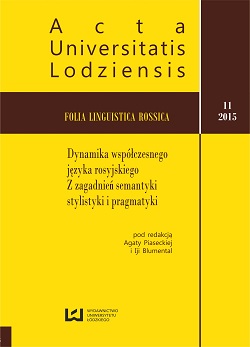Approval introduced in the narrative part (on the example of Polish, Russian and English)
DOI:
https://doi.org/10.18778/1731-8025.11.02Keywords:
Speech acts, approval, Polish, Russian, EnglishAbstract
The article is devoted to the analysis of the ways of expressing the speech act of approval in Polish, Russian and English. The material has been gathered from corpora, and only the examples have been taken into consideration where the phrase uttered by a speaker is introduced in the narration part as approval. This method of collecting material gives the opportunity to avoid misunderstanding in the process of the interpretation of the speaker’s intentions.
It occurs that approval introduced in the narrative part of a text is more often nonverbal in Polish and English materials. The lexical markers of the speech act under investigation display a considerable number of similarities between Polish, Russian and English examples. The utterances are usually stylistically neutral and they are generally simple in structure.
References
Austin J. L. (1962), How to Do Things with Words, Oxford.
Google Scholar
Awdiejew A. (1983), Klasyfikacja funkcji pragmatycznych, „Polonica” IX, s. 53‒88.
Google Scholar
Awdiejew A. (2007), Gramatyka interakcji werbalnej, Kraków.
Google Scholar
Czapiga A. (2009), Formalne wykładniki aprobaty w języku polskim, rosyjskim i angielskim, [w:] Świat Słowian w języku i kulturze X. Językoznawstwo. Semantyka. Pragmatyka. Kognitywizm, red. E. Komorowska, Ż. Kozicka-Borysowska, Szczecin, s. 42‒46.
Google Scholar
Czapiga A. (2012), Analiza pragmatyczna wypowiedzeń zawierających leksemy aprobować, одобрять, to approve, „Zeszyty Naukowe Uniwersytetu Rzeszowskiego. Zeszyt 76. Seria Filologiczna. Glottodydaktyka 4”, s. 20‒27.
Google Scholar
Czapiga A. (2013), Struktura aktu mowy aprobaty (na materiale języka polskiego, rosyjskiego i angielskiego), „Zeszyty Naukowe Uniwersytetu Rzeszowskiego. Zeszyt nr 80. Seria Filologiczna. Glottodydaktyka 5”, Rzeszów, s. 21‒29.
Google Scholar
Czamara А. (1977), Wartościujący akt illokucyjny, „Polonica” XVIII, s. 169‒174.
Google Scholar
Inny słownik języka polskiego (2000), tom I‒II, red. M. Bańko, Warszawa.
Google Scholar
Grzybowski W. (1985), O znaczeniach czasowników aprobować i zgadzać się, „Polonica” IX, s. 169‒177.
Google Scholar
Lipczuk R. (2000), O wielości i wieloznaczności terminów (na przykładzie klasyfikacji aktów mowy), „Acta ac Communitas”, nr 9, s. 169‒176.
Google Scholar
Gove P. B., (ed.) (2011), Webster’s Third New International Dictionary, www.m-w.com (12.01.2015).
Google Scholar
Weigand E. (1989), Sprache als Dialog. Sprachakttaxonomie und kommunikative Grammatik, Tübingen.
Google Scholar
DOI: https://doi.org/10.1515/9783111357799
Wierzbicka A. (1987), English Speech Act Verbs, Sydney.
Google Scholar
Wunderlich D. (1978), Studien zur Sprechakttheorie, Frankfurt/M.
Google Scholar
Searle J. R. (1969), Speech Acts: An Essay in the Philosophy of Language, Cambridge.
Google Scholar
DOI: https://doi.org/10.1017/CBO9781139173438
Słownik języka polskiego (1978), tom I, red. M. Szymczak, Warszawa.
Google Scholar
Большой толковый словарь русского языка (2009), ред. С. А. Кузнецов, Санкт-Петербург.
Google Scholar
Ожегов С. И., Шведова Н. Ю. (1998), Толковый словарь русского языка, Москва.
Google Scholar
Русский семантический словарь (1998), рeд. Н. Ю. Шведова, Москва.
Google Scholar
http://www.nkjp.uni.lodz.pl/ (29.01.2015).
Google Scholar
http://www.ruscorpora.ru/search-main.html (28.01.2015).
Google Scholar
http://www.natcorp.ox.ac.uk/ (27.01.2015).
Google Scholar
DOI: https://doi.org/10.1055/s-0035-1558948
Downloads
Published
How to Cite
Issue
Section
License

This work is licensed under a Creative Commons Attribution-NonCommercial-NoDerivatives 4.0 International License.









